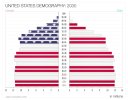We're about to face the same thing due to market forces (primarily higher education and health care) making 25-40 year old couples have on average fewer than 2 children.
True but not to the scale China (or Germany/entire EU really, Russia, Japan, South Korea, or Canada) are. And we have a replacement for the Boomers (largest generation ever in the Millennials (second largest generation ever) plus we are an attractive location for immigration which China certainly isn't.Not to verge anywhere near Thunderdome territory and trigger a bunch of folks, but anyone seen US population trends without immigration lately…?
For reference:
We look much more like Sponge Bob vice the inverted pyramid that the other countries I mentioned look like:



